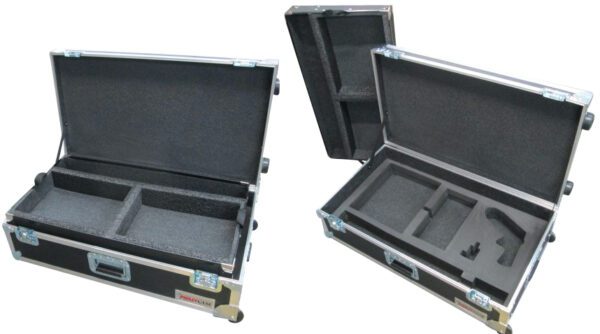 Investing in a durable road case for the protection of your trade show equipment, tools, instruments, and other valuable belongings is essential for their safe transportation.
Investing in a durable road case for the protection of your trade show equipment, tools, instruments, and other valuable belongings is essential for their safe transportation.
Firstly, decide if your road case, instrument case, equipment case, workbox, or workstation needs to be ATA certified. While these terms may sometimes be used interchangeably, it’s important to know for sure. This will dictate design and material (wood or molded hard plastic) specifications based on shipping requirements.
Next, let’s talk size. Bigger isn’t always better, but the more secure your items are in their cases, the safer they’ll be in transit. Perhaps all your equipment can fit in a single case, but it really should be shipped in two or three cases with extra foam for shock absorption.
The material of your case should also be taken into account if weight is a concern. The contents of the case are just part of the total weight that will have to be moved and a large molded plastic case weighs much less than the typical dresser-size, laminated wood case. Foam inserts that are cut to the shape of your instruments are a great way to soften a jolt or drop without adding lots of extra weight to your shipment.
A heavy road case with wheels, handles, or even forklift runners will give you convenience with your travels that you’ll be grateful for when getting your large and bulky equipment from point A to point B. And, since your case will be at your event anyway, think about designing a case with multipurpose functionality.
Adding drawers, racks, or shelves can be great for display or organization purposes. A charging road case can save you time trying to find cords and outlets, and a folding workstation gives you that convenient tablespace that can always come in handy. Finally, a case with latches and locks gives you peace of mind that your case is safe and secure each and every time you use it.
What Can You Ship with Road Cases?
Whether you’re shipping your road case as a sale, gift, or meeting up with it again at your destination, you’re entrusting it to protect your valuable contents from impacts and extreme conditions. While a Philly Case road case is perfect for personal uses, it’s also a great shipping solution for a variety of professionals in multiple industries, such as the entertainment or music industry.
Road cases are also great for trade show equipment and convention vendors as well as any traveling craftsmen using power tools and machinery. Philly Road Cases are perfect for shipping:
- Audio equipment
- Camera and visual equipment
- Speakers and amps
- Mixers or DJ workstation
- Karaoke equipment
- Lighting fixtures and consoles (with charging station)
- Musical instruments
- Vender displays or kiosks (racks and workstations)
- Small appliances like a coffee or espresso station
- Construction tools and machinery
- GPS and satellite equipment
- Musical instruments
- Firearms or archery gear
- Sports equipment
- UAV/Drone hardware
- Robotics equipment
- Gaming and computer or server hardware
- TVs, monitors, projectors, and digital display systems
With the ever-rising costs of flying with your cases, shipping may be your best option and there’s no better solution than trusting a Philly Case road case backed with a lifetime warranty.
Start Shipping with a Custom Road Case
What Are Road Cases Made Of?
A simple box with some bubble wrap won’t guarantee the protection of your valuables from bumps, bangs, and drops. A Philly Case road case is engineered with a strong structure made of molded plastic, lightweight poly (fiber), or furniture-grade plywood.
The most common are the durable and handsomely covered ABS laminated black wooden road cases with aluminum tongue-in-groove edges, recessed steel handles, and heavy-duty steel ball corners. Depending on what the road case is intended to house, the interior can be felt, carpet, bare wood, or custom cut foam inserts.
What Does It Mean if a Case Is ATA Approved?
It’s common for the term ‘road case’ or ‘flight case’ to be used interchangeably with ‘ATA case.’ However, for a road case to be certified by the Air Transport Association (ATA), it is required to have certain shipping specifications.
For the overly ambitious reader of detailed governmental documentation, the Spec. 300 Category 1 specification design and development standards can be found online courtesy of the ATA. These guidelines were initially intended as a requirement for containers shipping via air transit but, as we know, typically refers to the style of case that we call a ‘road case.’
Build Your Own Road Case with Philly Case!
Solving your road case shipping dilemmas is a breeze when you design your custom case with Philly Case. You can start with a standard design and work with experienced designers to modify your case for particular needs.
To begin your project, go to the online web form, call 1.800.505.8179, or email sales@phillycase.com. Our experts will walk you through all of your shipping, material, and accessory needs and provide a comprehensive list of suitable options. Working with the design team is the fun part, getting updates from the production is the exciting part, and receiving your perfectly engineered road case is both satisfying and rewarding knowing you can rely on your built-to-last Philly Case for years to come.

